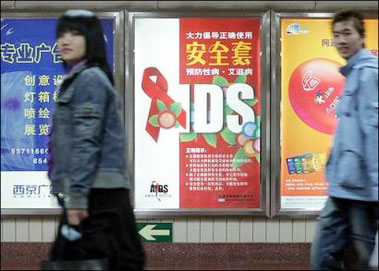GENEVA - China is emerging from the shadows of the AIDS pandemic by improving
its accounting of the number of cases within the country, the UN agency
spearheading the fight against the disease said.

Chinese commuters walk
pass an anti-AIDS campaign poster at a subway station in Beijing. China is
emerging from the shadows of the AIDS pandemic by improving its accounting
of the number of cases within the country, the UN agency spearheading the
fight against the disease said. [AFP] |
An
estimated 650,000 people in China had the HIV virus at the end of 2005, while
31,000 deaths due to AIDS have been recorded since the disease was first
discovered there, UNAIDS said in its biennial snapshot of the global pandemic.
Critics had feared the world's most populous nation could be a black hole in
the global prevention and treatment effort, accusing authorities there of
failing to acknowledge a spiralling epidemic driven by illicit drug use.
"Not only is more data available, but the analysis of that data has also
improved and has allowed us to come to an estimate that we are quite comfortable
with," said Peter Ghys, manager of epidemic and impact monitoring at UNAIDS.
The UNAIDS report said 45 percent of injecting drug users were being targeted
by prevention programmes in China, and 25 percent of sex workers, highlighting
the focus of official concern in the country.
Just eight percent of male heterosexuals were being reached by prevention
programmes in 2005.
The official HIV prevalence rate of 0.1 percent in China compares with a rate
of 0.9 percent in India -- the second-most populous nation -- where the epidemic
is largely fuelled by unprotected heterosexual sex, according to the report.
UNAIDS has reduced its estimate of HIV patients in China down to a range of
between 390,000 and 1.1 million people. In its previous report two years ago the
equivalent range was 430,000 to as many as 1.5 million people.
But after refining its previous data as well, the report concluded that the
prevalence rate was rising in China, as well as in neighbouring Vietnam.
A quarter of those ill in China were receiving life-saving antiretroviral
drugs -- above the Asian average of 16 percent, the report found.
"The overlapping risks of injecting drug use and unprotected sex feature in
several other epidemics in Asia", the report noted, citing Vietnam.
HIV has now spread into all 59 Vietnamese provinces and all cities. HIV
infections have doubled there in five years to affect 260,000 Vietnamese, the
report said. About 40,000 people are being infected every year.
But UNAIDS also gave signs of progress in southeast Asia.
Thailand, once a focus of concern as the epidemic spiralled there in the
1990s mainly due to prostitution, now has an HIV prevalence rate of 1.6 percent,
one-third lower than in the previous decade.
Prevention efforts have borne fruit in Thailand as fewer men bought sex and
condom use increased.
However, the 580,000 people with HIV in Thailand include some 16,000
children, according to UNAIDS.
And recent studies there have highlighted a growing number of HIV infections
among women infected by their long-term partners -- one-third in 2005.